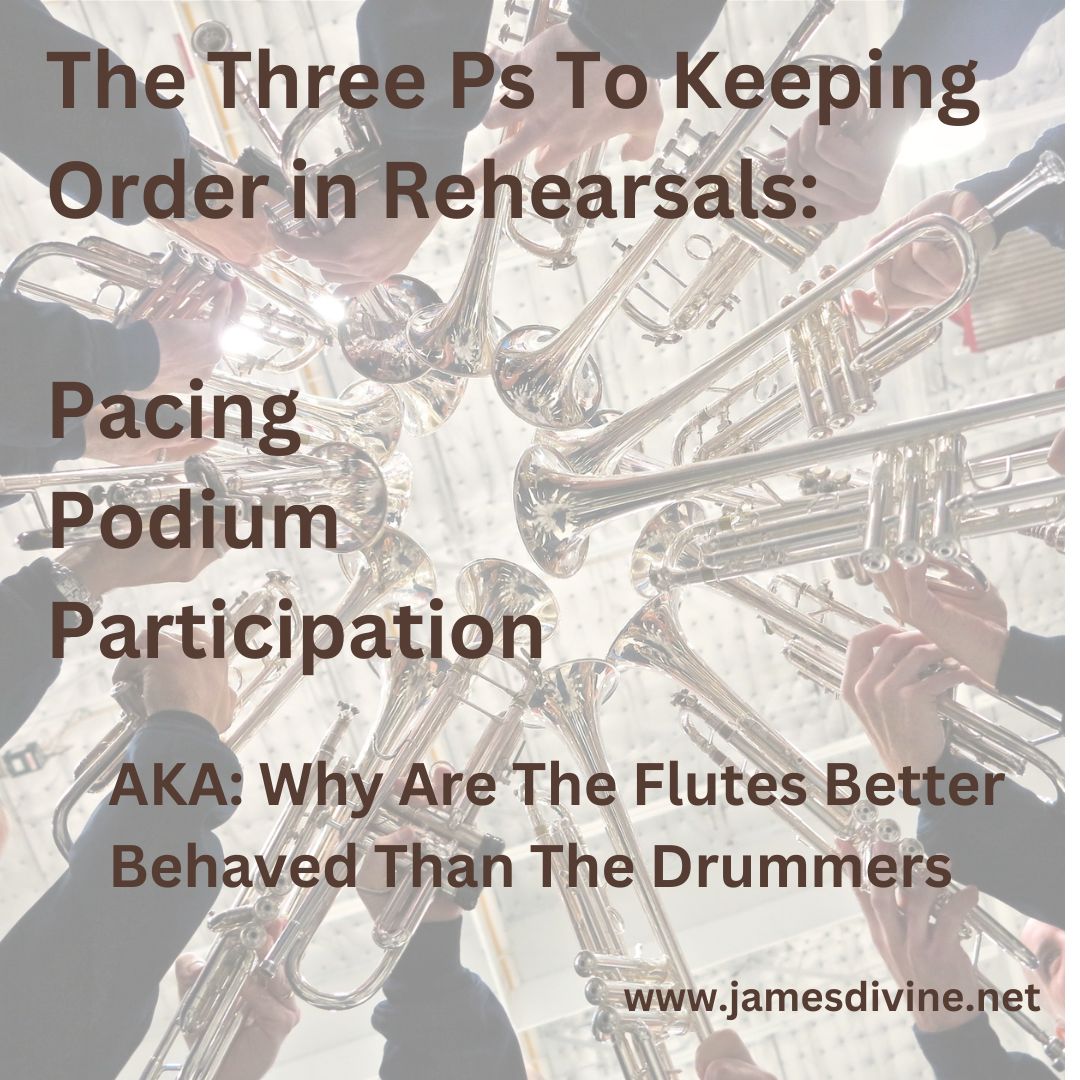Have you ever noticed that the flutes are often the best behaved students in the band while the drummers…well, you know! YOU can do a few simple things to turn this around. It’s not that flutes are better than percussionists. The saxes are the absolute best section.
Podium
The podium FEELS safe, but it can be a huge barrier between you and students and actually doing some teaching. The flutes are closer to you. That’s the only reason they are better behaved. In my 2nd year of teaching, I had a VERY energetic percussionist who was always getting into trouble. I actually brought his instruments to the front of the class. A visitor mentioned, “That’s NOT the proper place for percussionists in a concert band.” I explained it was temporary, not permanent.
Refer back to the First Week of School chapter to see how I include aisles and walkways so I can easily get to ANY musician in the band. The only time I don’t set-up like that is at concerts. So GET OFF THE PODIUM and move around among the students. You’ll see more poor posture, you’ll hear things in tone and articulation that will surprise you, and maybe you’ll even find out students have had wrong hand positions or fingerings. Some students have mastered how to talk quietly. Some are experts at texting without looking.
Pacing
The second P is pacing. Make your transitions tight. Put an agenda on the board.
Some students get really focused on the agenda; “Mr. Divine, you skipped something!” I explain to them that the agenda is a guide. If we are planning on spending 30 minutes on something but it only takes us 5 because everybody practiced it at home (I can dream, right), then we’re going to move on to something else.
Are you planning on playing some music for the students? Have that cued and ready to go. If you have to search for it and put the class on hold, students are going to misbehave.
Sometimes we need to spend 20 minutes focusing on a small passage, but you also need to break that up. Have some short lessons ready to go – maybe something in the music you know will be easy and quick to fix. If the rehearsal has been intense with lots of playing, maybe it’s time to spend a few minutes not playing, but still doing a rhythm or listening exercise where everyone is engaged. This could also be a place to insert a short music history lesson or talk about the composer of the piece.
Put the responsibility for some of the pacing back onto the students.
One year I was fortunate enough to have marching band as a regular, during the school day class. Students were dragging their feet getting out to the stadium to start practice. Nothing seemed to work to get them motivated. Because they had other classes after marching band, I usually gave them 7-8 minutes to pack up, rest, grab a snack, etc. I informed them that I was tired of nagging them and if they didn’t make it out to the stadium within 2 minutes of me reaching the stadium, we would lose out on that gift of time. As soon as the bell rang to start class, I started for the stadium. As soon as I reached the stadium, I started my 2 minute timer. The first week it took them about three minutes to get out there. I went ahead and awarded them the “time” because they had made a huge effort. After the first week, they made it within the 2 minutes every single time.
Participation
100% every day. Every class. Every person. That’s my expectation.
Get off the podium and walk around. That’s going to help.
When asking questions, the same 20% of kids like to raise their hands. I want to ensure 100% participation so I will put an asterisk next to a kids’ name who has already answered a question. The goal is to keep track of who has answered and call on those who haven’t. I tell the students I’m going to eventually call on everyone. That it’s ok to have a wrong answer. That’s how we learn. I don’t allow others to put the student down. And usually I don’t allow “I don’t know” as an aswer. You have to guess or give your best answer. Often these kids find out they’re right – they DO have the answer. And when they realize I’m going to call on everyone, they are more proactive about volunteering when they are sure they know the answer.
James Divine is a retired music teacher. He still teaches half time at a charter school, spending the other half leading Professional Development and creating curriculum like Jazz From The Start to teach jazz and improv to young students. Get an early edition of his book Almost Everything I’ve Learned About Teaching Band.
